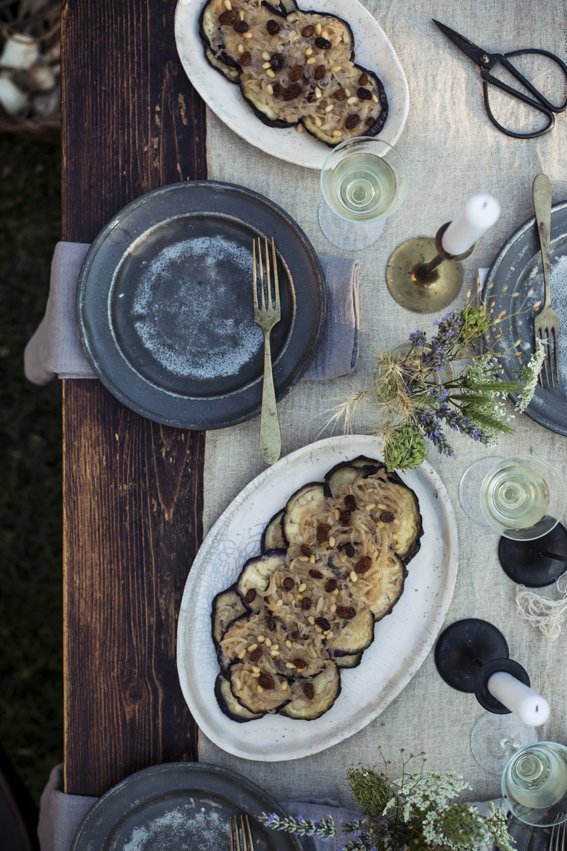Melanzane in Saor
Venetian sweet and sour eggplant
Lately, the summer light brings me to explore some new arrangements and corners of my home, but especially my beautiful garden that in this season turns into a kind of lush oasis where the plants give their best.
The golden light calls us outside our dark rooms only after 19:00 pm, when the air becomes lighter and the breeze that smells like lagoon, gently moves the higher tree tops.
Generally, houses in Italy are not so bright inside, especially the old ones and especially in Venice. Windows are not so wide and very often they have different shapes and dimensions. They're square, round, straight, or slanting, with shutters or without. Heavy drapes and velvet curtains obscure most of the Venetian palaces' windows; even walls are covered with precious tissues like damasco or broccato veneziano.
In summer, this style, however, can be heavy, just like some recipes, which are more suitable for winter.
The recipe I'm about to share instead, besides being one of my all-time favorites, is tasty and fresh, perfect for summer, casual lunches or dinners with friends in the garden or on a boat! (On a boat because eating "saor" is actually a ritual and tradition of the Festa del Redentore, which is held in Venice on the third Saturday of July).
Saor is the Venetian term for flavor, used to indicate a dressing of vinegar and onions, originally used by Venetian fishermen to preserve their stock.
Melanzane in Saor is a vegetarian variation of one of the most traditional Venetian recipes: Sarde in Saor, which are fried sardines topped with this sweet and sour dressing made of white onions.
The procedure to make Melanzane in Saor is pretty much identical to the one to make sardines, and in the same way, you can also make other vegetables like zucchini, peppers or pumpkin.
Here's how to do it:
MELANZANE IN SAOR
Ingredients:
(Serves 4/5)
1 kg di eggplants (ideal quality: black round or long type, with few seeds)
1 kg of white onions
½ glass of white wine vinegar
½ cup of raisins
100 g of pine nuts
½ tsp of sugar
3 tbsp of extra virgin olive oil
1 glass of water
1 cup of coarse salt
For frying the eggplants, as needed:
Oil to fry
Flour to dust the eggplants
Salt
* For a lighter / healthier version you can replace fried eggplants with grilled eggplants, the result will be different but equally good!
Instructions:
Place the raisins in a bowl and cover with warm water, then leave to soak until needed. Lightly toast the pine nuts in a dry pan over a medium heat.
Wash and dry the eggplants and slice them into slices 1/2 cm thick. Lay out the eggplants in a colander, alternating the slices with a handful of coarse salt, making sure they're all sprinkled well. Place a heavy plate over the eggplants and let them purge from their bitter water for at least 30 minutes.
In the meantime, go ahead by washing and peeling the onions, and then slice them finely.
Heat a frying pan over medium-low heat and add 3 tablespoons of extra virgin olive oil. Add the onions together with the glass of water and cook them slowly for at least 15/20 minutes, stirring every now and then.
Add half a glass of white vinegar and half a teaspoon of sugar and cook on low heat until reduced for at least another 10 minutes until the onions result well cooked and slightly caramelized but not mushy. Keep them aside.
Rinse the eggplant slices and dry them very well with a paper towel. Heat the oil in a frying pan.
Dust the eggplant slices in flour and deep fry in plenty of oil until golden and crisp. Season with salt and set aside on some paper towel to drain until needed.
Once all the ingredients are ready, proceed by placing a layer of eggplants in a small terrine, deep plate, or a tray and top them with some of the onions, a small handful of (drained) raisins, and pine nuts.
Continue layering until the eggplants are used up. The final level must be well topped with onions, raisins, and pine nuts.
Cover with plastic wrap and allow to marinate in the fridge at least for one night before serving. They'll become better as long you'll keep them in the fridge! Serve at room temperature and consume them within a week.





